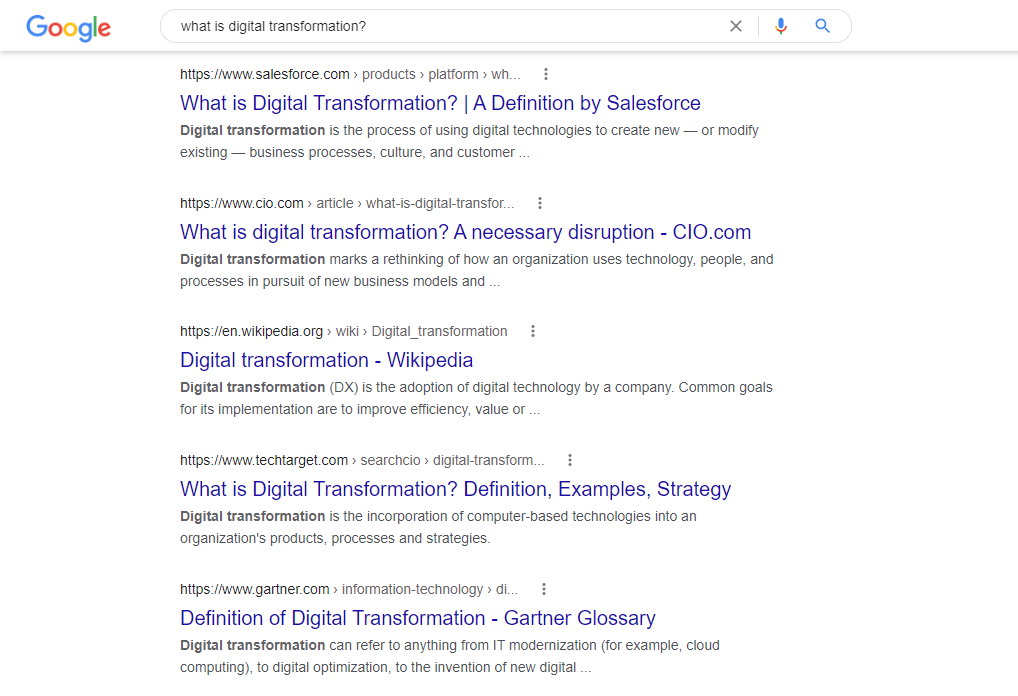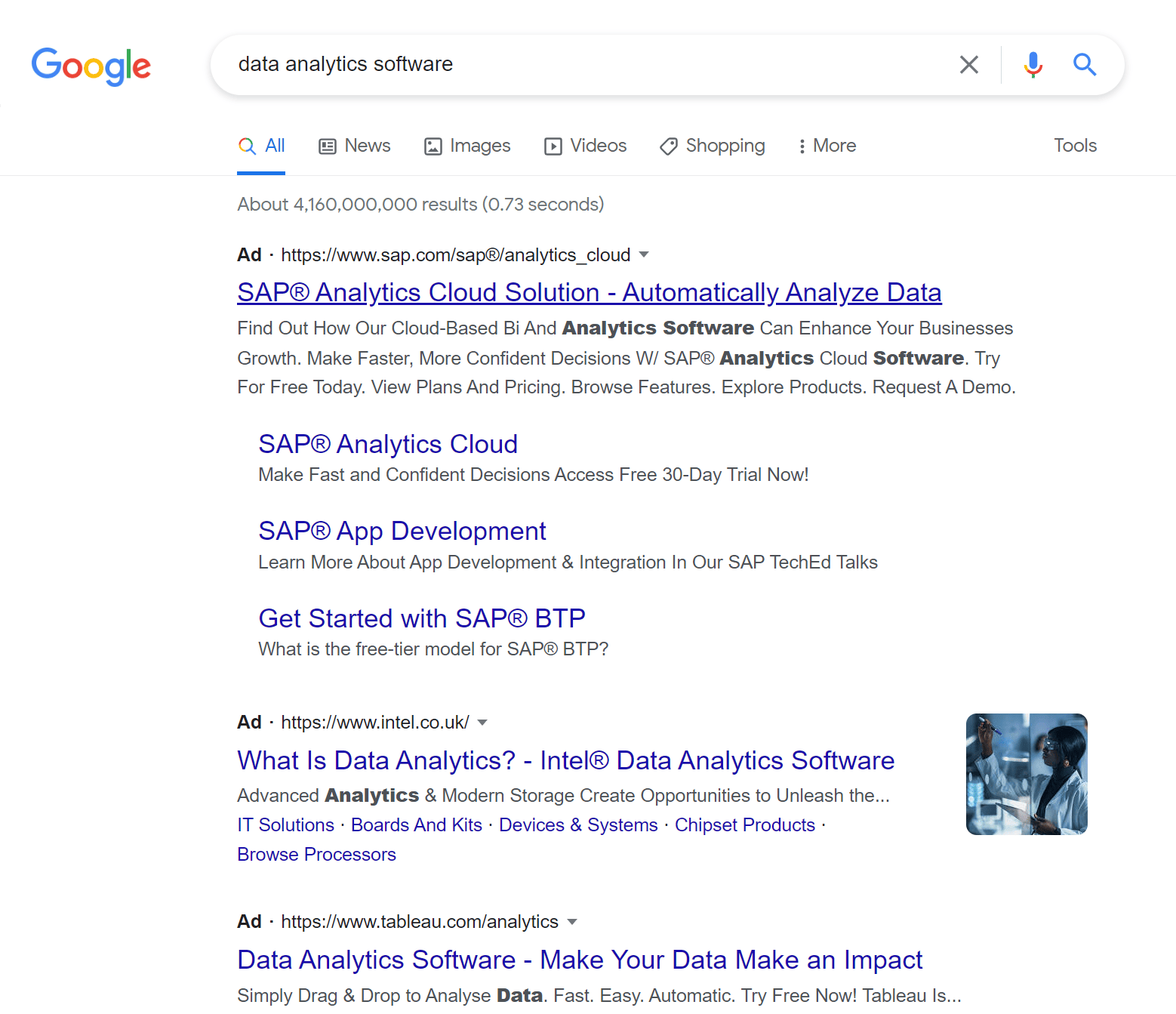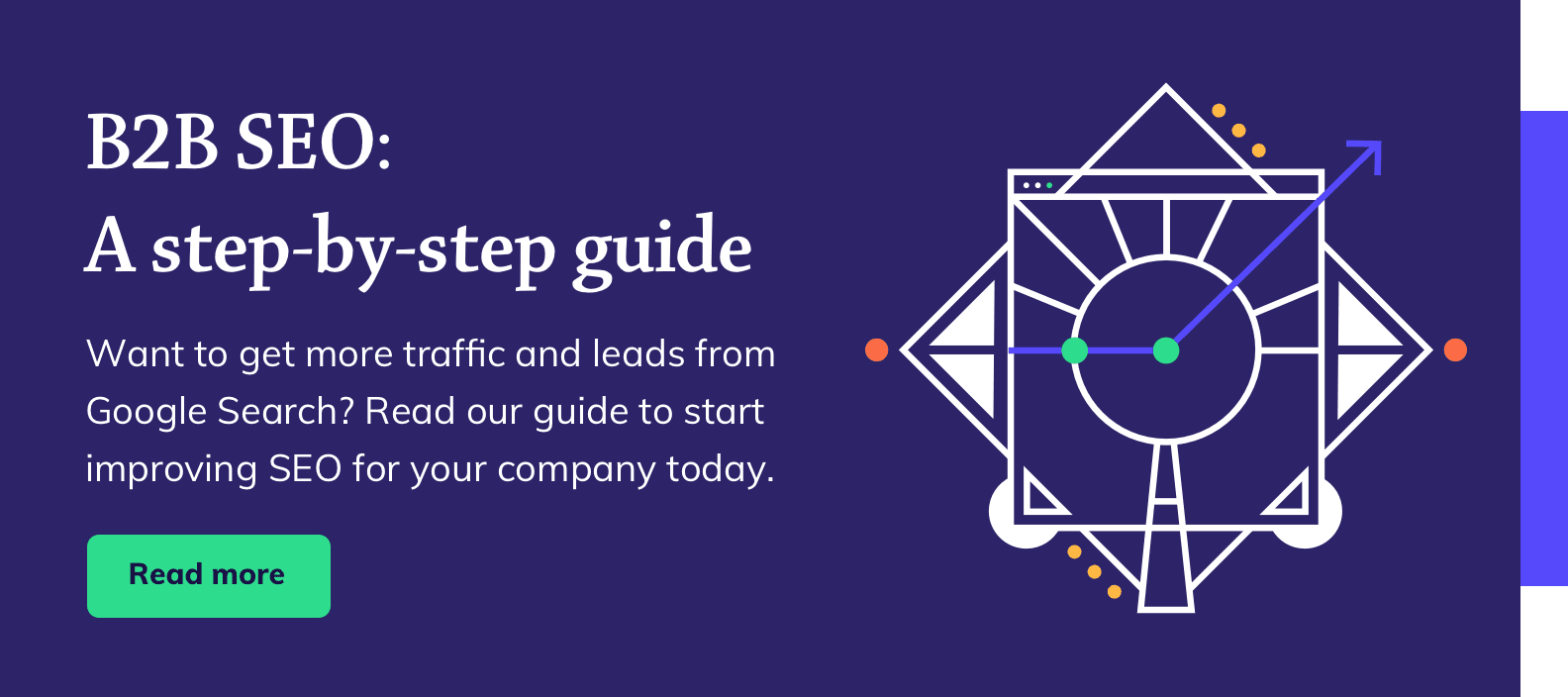Organic and paid search are essential components of inbound marketing success. They’re two of the most effective channels for traffic acquisition and lead generation. But to get maximum bang for your buck in B2B, you must know how and when to use them.
What is organic search?
Organic search refers to the unpaid links – also known as Blue Link results – that appear on a search engine results page (SERP). When you enter a query, Google and other search engines use sophisticated algorithms to scour the web and find the most relevant content based on the keyword or phrase you enter.
This is how Blue Link results appear in organic SERPs:

Crucially, advertisers can’t influence organic search directly. You can’t pay Google a premium to improve your search ranking. Success depends on the quality of your content in terms of composition, structure, and search engine optimisation (SEO). Search is, more or less, a level playing field.
Aside from Blue Link results, organic SERPs may also include:
- Featured snippets
- Videos
- News
- User reviews
- Directions
- People also ask
- Related searches
53% of all website traffic comes from organic search.
What is paid search?
Paid search refers to any paid advertisement that appears in the sponsored links section of a SERP.
Pay-per-click (PPC) is the most common model. It allows you to bid on specific keywords and build targeted campaigns that promote your products or services to prospective customers. Every time someone clicks on one of your ads, you pay a fee to the host platform. The user is then directed to your website where they can explore your offering, get in touch with sales, or make a purchase.
This is how PPC ads typically appear on a SERP:

Competition for space in the sponsored links section of a SERP is fierce. So, advertising platforms use several factors to determine which ads to promote:
- Bid value
- Keyword relevance
- Ad quality and relevance
- Landing page quality
- Historical click-through rate
You get out what you put in when it comes to paid search. If an ad or campaign performs well, you can increase your budget to improve your results (up to a certain point).
68% of marketers agree that paid ads are important or extremely important to their marketing strategy.
How to choose between organic search and paid search
It’s not really an either/or decision.
Organic and paid search are complementary channels. And deciding which one’s right for a given situation depends on several factors, including:
- Industry
- Market
- User intent
- Domain authority
Short vs long-term value
Paid search delivers quick results. The downside is, it’s transactional. You must continuously invest in paid to drive traffic and, as soon as your campaign ends, you won’t rank for those keywords anymore. If you operate in a competitive market with multiple businesses bidding on the same terms, you’ll end up paying more for the same amount of traffic. This is why it’s best to avoid a paid-only strategy.
Organic search, on the other hand, is more of a slow burn. It can take up to 18-months before you start to see ROI from organic search and some businesses don’t feel they can wait that long. But, organic delivers long-term value. High-quality content drives traffic and generates leads for years to come – with little additional investment.
There is one caveat. Even if you rank first organically, your content might not appear above the fold on a SERP – depending on the number of paid ads and SERP features. So you could miss out on a key source of traffic if you don’t use paid.
HubSpot’s real estate analogy sums it up perfectly. Paid is like renting a flat. Whereas organic is like owning a house.
Blend recommends
Paid search is a great way to bridge the gap and deliver some quick wins while you grow your organic traffic.
Industry, market, and audience
Market size and saturation can have a significant impact on the efficacy of paid search. An IT company that specialises in cloud security, for example, must compete with hundreds of other companies for the same digital real estate – including the likes of Amazon and Microsoft. And you’re never going to oust them from the top spot.
For businesses in competitive markets, organic search is often the way to go. Especially in B2B.
B2B sales cycles are long. Customers like to research potential solutions before putting down any money. It makes sense, right? When you’re investing tens of thousands of pounds into a product or service, it’s in your best interests to do your due diligence.
In fact, B2B customers spend only 17% of the buyer’s journey talking to suppliers. The rest of their time goes towards researching potential solutions and comparing suppliers. So, producing educational content that explains what you do and the value you provide is more likely to deliver the results you need.
Be aware
Many B2B customers use adblockers, especially in more technical industries. Bear that in mind if you plan on running a paid campaign.
Keyword intent
Keywords come in many shapes and sizes. The intent behind them can help you determine where someone is in the buyer’s journey and how best you can serve their needs.
For this article, we’re going to focus on the two that are most important to B2B SEO:
Informational keywords are the bread and butter of organic search. These are the phrases searchers use in the early stages of the buyer’s journey to define a problem they’re experiencing or find the answer to a specific problem. ‘How to generate more leads?’ or ‘What is inbound marketing?’
There’s little to be gained by bidding on keywords that help customers educate themselves. That’s why paid search focuses more on commercial keywords. The customer has defined the problem and now they’re looking for a solution. ‘Inbound marketing agencies’, for example.
Domain authority
If you’re an established business with good domain authority, you won’t derive as much value from paid search as a new business.
Let’s say your company provides cybersecurity services for UK businesses with 250+ employees. You’re on the first page of Google for terms like ‘enterprise cyber security’. Running a paid campaign on that term would have little effect on your position. You already rank better than most of your competitors.
That said, investment and return on ad spend (ROAS) go hand in hand. A paid campaign can still be effective for established companies if it delivers a positive ROI. HubSpot offers a free ad spend calculator if you want to find out what kind of ROI you can expect.
The best use of your resources in this scenario would be to re-invest in organic search. Creating a consistent stream of relevant content will help you solidify your position and reinforce your domain authority.
For new businesses, paid search helps to raise brand awareness and acquire more traffic while you build your organic content library. One thing to bear in mind is that, if you’re competing with the likes of Amazon and Facebook, the cost-per-click could be so high that running a paid campaign simply isn’t worth it.
Blend recommends
Don’t go overboard. While paid search can help businesses with low domain authority, you shouldn’t blow your entire budget on PPC if you’re competing for competitive search terms.
The best marketing strategies combine the best of both
Organic and paid search should work in tandem as part of your wider marketing strategy.
Targeted, paid campaigns are the best option if you want to raise brand awareness when you’re just starting out or are looking for some quick wins. Organic search requires more patience. But by investing in relevant, SEO-optimised content, you lay the foundation for long-term inbound success.
Related blog posts
Inbound marketing vs. SEO: what’s the difference?





